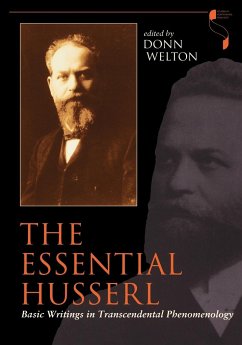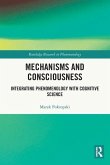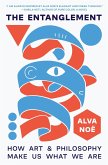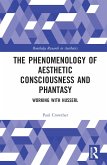The Essential Husserl
Basic Writings in Transcendental Phenomenology
Herausgeber: Welton, Donn
The Essential Husserl
Basic Writings in Transcendental Phenomenology
Herausgeber: Welton, Donn
- Broschiertes Buch
- Merkliste
- Auf die Merkliste
- Bewerten Bewerten
- Teilen
- Produkt teilen
- Produkterinnerung
- Produkterinnerung
The first anthology in English of Edmund HusserlOs major writings.
Andere Kunden interessierten sich auch für
![The Entanglement The Entanglement]() Alva NoeThe Entanglement21,99 €
Alva NoeThe Entanglement21,99 €![Mechanisms and Consciousness Mechanisms and Consciousness]() Marek PokropskiMechanisms and Consciousness42,99 €
Marek PokropskiMechanisms and Consciousness42,99 €![The Entanglement The Entanglement]() Alva NoeThe Entanglement16,99 €
Alva NoeThe Entanglement16,99 €![The Phenomenology of Aesthetic Consciousness and Phantasy The Phenomenology of Aesthetic Consciousness and Phantasy]() Paul Crowther (Slovenia Alma Mater University Europaea)The Phenomenology of Aesthetic Consciousness and Phantasy180,99 €
Paul Crowther (Slovenia Alma Mater University Europaea)The Phenomenology of Aesthetic Consciousness and Phantasy180,99 €![A Brief History of Thought A Brief History of Thought]() Luc FerryA Brief History of Thought18,99 €
Luc FerryA Brief History of Thought18,99 €![From Trust to Trustworthiness From Trust to Trustworthiness]() From Trust to Trustworthiness59,99 €
From Trust to Trustworthiness59,99 €![The Phenomena of Awareness The Phenomena of Awareness]() Cecile TougasThe Phenomena of Awareness65,99 €
Cecile TougasThe Phenomena of Awareness65,99 €-
-
-
The first anthology in English of Edmund HusserlOs major writings.
Hinweis: Dieser Artikel kann nur an eine deutsche Lieferadresse ausgeliefert werden.
Hinweis: Dieser Artikel kann nur an eine deutsche Lieferadresse ausgeliefert werden.
Produktdetails
- Produktdetails
- Studies in Continental Thought
- Verlag: Indiana University Press
- Seitenzahl: 408
- Erscheinungstermin: 22. Mai 1999
- Englisch
- Abmessung: 254mm x 179mm x 24mm
- Gewicht: 798g
- ISBN-13: 9780253212733
- ISBN-10: 0253212731
- Artikelnr.: 22277970
- Herstellerkennzeichnung
- Libri GmbH
- Europaallee 1
- 36244 Bad Hersfeld
- gpsr@libri.de
- Studies in Continental Thought
- Verlag: Indiana University Press
- Seitenzahl: 408
- Erscheinungstermin: 22. Mai 1999
- Englisch
- Abmessung: 254mm x 179mm x 24mm
- Gewicht: 798g
- ISBN-13: 9780253212733
- ISBN-10: 0253212731
- Artikelnr.: 22277970
- Herstellerkennzeichnung
- Libri GmbH
- Europaallee 1
- 36244 Bad Hersfeld
- gpsr@libri.de
edited by Donn Welton
Acknowledgments
Introduction: The Development of Husserl's Phenomenology
Abbreviations
Part One: Contours of a Transcendental Phenomenology
I. Antitheses
1. The Critique of Psychologism
Normative and Theoretical Disciplines
The Arguments of Psychologism
The Prejudices of Psychologism
2. The Critique of Historicism
II. Phenomenological Clues
3. Expression and Meaning
Essential Distinctions
Fluctuation in Meaning and the Ideality of Unities of Meaning
The Phenomenological and Ideal Content of the Experiences of Meaning
4. Meaning-Intention and Meaning-Fulfillment
III. Phenomenology as Transcendental Philosophy
5. The Basic Approach of Phenomenology
The Natural Attitude and Its Exclusion
Consciousness as Transcendental
The Region of Pure Consciousness
IV. The Structure of Intentionality
6. The Noetic and Noematic Structure of Consciousness
Noesis and Noema
The Question of Levels
Expressive Acts
Noema and Object
Horizons
V. The Question of Evidence
7. Varieties of Evidence
8. Sensuous and Categorial Intuition
VI. From Subjectivity to Intersubjectivity
9. Empathy and the Constitution of the Other
Primordial Abstraction
The Appresentation of the Other
Part Two: Transcendental Phenomenology and the Problem of the Life-World
VII. Transcendental Aesthetics
10. Perception, Spatiality and the Body
Objective Reality, Spatial Orientation, and the Body
The Self-Constitution of the Body
11. A Phenomenology of the Consciousness of Internal Time
Analysis of the Consciousness of Time
Levels of Constitution of Time and Temporal Objects
12. Horizons and the Genesis of Perception
VIII. Transcendental Analytics
13. Formal and Transcendental Logic
The Discipline of Formal Logic
Formal Logic as Apophantic Analysis
The Transcendental Grounds of Logic
14. Individuals and Sets
Explication of Individuals
Constituting Sets
15. Universals
The Constitution of Empirical Universals
Eidetic Variation and the Acquisition of Pure Universals
16. The Genesis of Judgment
IX. Static and Genetic Phenomenology
17. Time and the Self-Constitution of the Ego
18. Static and Genetic Phenomenological Method
X. Transcendental Phenomenology and the Way through the Science of
Phenomenological Psychology
19. Phenomenological Psychology and Transcendental Phenomenology
XI. Transcendental Phenomenology and the Way through the Life-World
20. The Mathematization of Nature
21. Elements of a Science of the Life-World
Bibliography
Index
Introduction: The Development of Husserl's Phenomenology
Abbreviations
Part One: Contours of a Transcendental Phenomenology
I. Antitheses
1. The Critique of Psychologism
Normative and Theoretical Disciplines
The Arguments of Psychologism
The Prejudices of Psychologism
2. The Critique of Historicism
II. Phenomenological Clues
3. Expression and Meaning
Essential Distinctions
Fluctuation in Meaning and the Ideality of Unities of Meaning
The Phenomenological and Ideal Content of the Experiences of Meaning
4. Meaning-Intention and Meaning-Fulfillment
III. Phenomenology as Transcendental Philosophy
5. The Basic Approach of Phenomenology
The Natural Attitude and Its Exclusion
Consciousness as Transcendental
The Region of Pure Consciousness
IV. The Structure of Intentionality
6. The Noetic and Noematic Structure of Consciousness
Noesis and Noema
The Question of Levels
Expressive Acts
Noema and Object
Horizons
V. The Question of Evidence
7. Varieties of Evidence
8. Sensuous and Categorial Intuition
VI. From Subjectivity to Intersubjectivity
9. Empathy and the Constitution of the Other
Primordial Abstraction
The Appresentation of the Other
Part Two: Transcendental Phenomenology and the Problem of the Life-World
VII. Transcendental Aesthetics
10. Perception, Spatiality and the Body
Objective Reality, Spatial Orientation, and the Body
The Self-Constitution of the Body
11. A Phenomenology of the Consciousness of Internal Time
Analysis of the Consciousness of Time
Levels of Constitution of Time and Temporal Objects
12. Horizons and the Genesis of Perception
VIII. Transcendental Analytics
13. Formal and Transcendental Logic
The Discipline of Formal Logic
Formal Logic as Apophantic Analysis
The Transcendental Grounds of Logic
14. Individuals and Sets
Explication of Individuals
Constituting Sets
15. Universals
The Constitution of Empirical Universals
Eidetic Variation and the Acquisition of Pure Universals
16. The Genesis of Judgment
IX. Static and Genetic Phenomenology
17. Time and the Self-Constitution of the Ego
18. Static and Genetic Phenomenological Method
X. Transcendental Phenomenology and the Way through the Science of
Phenomenological Psychology
19. Phenomenological Psychology and Transcendental Phenomenology
XI. Transcendental Phenomenology and the Way through the Life-World
20. The Mathematization of Nature
21. Elements of a Science of the Life-World
Bibliography
Index
Acknowledgments
Introduction: The Development of Husserl's Phenomenology
Abbreviations
Part One: Contours of a Transcendental Phenomenology
I. Antitheses
1. The Critique of Psychologism
Normative and Theoretical Disciplines
The Arguments of Psychologism
The Prejudices of Psychologism
2. The Critique of Historicism
II. Phenomenological Clues
3. Expression and Meaning
Essential Distinctions
Fluctuation in Meaning and the Ideality of Unities of Meaning
The Phenomenological and Ideal Content of the Experiences of Meaning
4. Meaning-Intention and Meaning-Fulfillment
III. Phenomenology as Transcendental Philosophy
5. The Basic Approach of Phenomenology
The Natural Attitude and Its Exclusion
Consciousness as Transcendental
The Region of Pure Consciousness
IV. The Structure of Intentionality
6. The Noetic and Noematic Structure of Consciousness
Noesis and Noema
The Question of Levels
Expressive Acts
Noema and Object
Horizons
V. The Question of Evidence
7. Varieties of Evidence
8. Sensuous and Categorial Intuition
VI. From Subjectivity to Intersubjectivity
9. Empathy and the Constitution of the Other
Primordial Abstraction
The Appresentation of the Other
Part Two: Transcendental Phenomenology and the Problem of the Life-World
VII. Transcendental Aesthetics
10. Perception, Spatiality and the Body
Objective Reality, Spatial Orientation, and the Body
The Self-Constitution of the Body
11. A Phenomenology of the Consciousness of Internal Time
Analysis of the Consciousness of Time
Levels of Constitution of Time and Temporal Objects
12. Horizons and the Genesis of Perception
VIII. Transcendental Analytics
13. Formal and Transcendental Logic
The Discipline of Formal Logic
Formal Logic as Apophantic Analysis
The Transcendental Grounds of Logic
14. Individuals and Sets
Explication of Individuals
Constituting Sets
15. Universals
The Constitution of Empirical Universals
Eidetic Variation and the Acquisition of Pure Universals
16. The Genesis of Judgment
IX. Static and Genetic Phenomenology
17. Time and the Self-Constitution of the Ego
18. Static and Genetic Phenomenological Method
X. Transcendental Phenomenology and the Way through the Science of
Phenomenological Psychology
19. Phenomenological Psychology and Transcendental Phenomenology
XI. Transcendental Phenomenology and the Way through the Life-World
20. The Mathematization of Nature
21. Elements of a Science of the Life-World
Bibliography
Index
Introduction: The Development of Husserl's Phenomenology
Abbreviations
Part One: Contours of a Transcendental Phenomenology
I. Antitheses
1. The Critique of Psychologism
Normative and Theoretical Disciplines
The Arguments of Psychologism
The Prejudices of Psychologism
2. The Critique of Historicism
II. Phenomenological Clues
3. Expression and Meaning
Essential Distinctions
Fluctuation in Meaning and the Ideality of Unities of Meaning
The Phenomenological and Ideal Content of the Experiences of Meaning
4. Meaning-Intention and Meaning-Fulfillment
III. Phenomenology as Transcendental Philosophy
5. The Basic Approach of Phenomenology
The Natural Attitude and Its Exclusion
Consciousness as Transcendental
The Region of Pure Consciousness
IV. The Structure of Intentionality
6. The Noetic and Noematic Structure of Consciousness
Noesis and Noema
The Question of Levels
Expressive Acts
Noema and Object
Horizons
V. The Question of Evidence
7. Varieties of Evidence
8. Sensuous and Categorial Intuition
VI. From Subjectivity to Intersubjectivity
9. Empathy and the Constitution of the Other
Primordial Abstraction
The Appresentation of the Other
Part Two: Transcendental Phenomenology and the Problem of the Life-World
VII. Transcendental Aesthetics
10. Perception, Spatiality and the Body
Objective Reality, Spatial Orientation, and the Body
The Self-Constitution of the Body
11. A Phenomenology of the Consciousness of Internal Time
Analysis of the Consciousness of Time
Levels of Constitution of Time and Temporal Objects
12. Horizons and the Genesis of Perception
VIII. Transcendental Analytics
13. Formal and Transcendental Logic
The Discipline of Formal Logic
Formal Logic as Apophantic Analysis
The Transcendental Grounds of Logic
14. Individuals and Sets
Explication of Individuals
Constituting Sets
15. Universals
The Constitution of Empirical Universals
Eidetic Variation and the Acquisition of Pure Universals
16. The Genesis of Judgment
IX. Static and Genetic Phenomenology
17. Time and the Self-Constitution of the Ego
18. Static and Genetic Phenomenological Method
X. Transcendental Phenomenology and the Way through the Science of
Phenomenological Psychology
19. Phenomenological Psychology and Transcendental Phenomenology
XI. Transcendental Phenomenology and the Way through the Life-World
20. The Mathematization of Nature
21. Elements of a Science of the Life-World
Bibliography
Index








